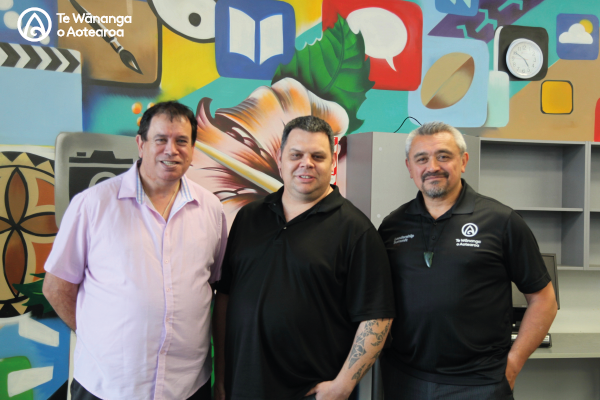The certified IT-geek and a self-confessed tutū is in the development stages of implementing the first Innovation Hub for Te Wānanga o Aotearoa with support from Tumuhangarau Grant Strang and Tumuaramātauranga Nepia Winiata.
The first Hub in Māngere will initially target secondary school students to do photography, video production, music, coding and app development, 3D design, robotics, and graphic design in an informal learning environment.
It is hoped in time, it will also open up to provide opportunities for current tauira and kaimahi to participate as well.
Sponsored by Hangarau, the first Hub as a Proof of Concept, will be based at Māngere Campus with plans for additional hubs across other campuses too.
Kane says he sees this as a way to engage in an educational paradigm changer for what the future looks like, by getting future members exploring their creative passions and critical thinking.
"These Hubs are about engaging rangatahi, increasing digital fluency and developing our critical creativity and capacity for innovation with technology," he says.
"With this type of design-based thinking, it's also important to remember our indigenous capacity and expertise. With aroha and whānaungatanga at its core, we are the designers, inventors, entrepreneurs, scientists, artists and leaders."
The 43-year-old's foray into this field of work is life-long. Growing up he felt frustrated by the lack of inspiration in his classrooms and rebelled.
"First of all I'm a tūtu, I couldn't wait to start pulling things apart. Secondly, I've always had a hunger for learning and that's what I want our rangatahi to discover, if they haven't already.
With an aptitude for computers Kane worked in IT for a number of South Auckland schools.
Then a conversation to start a free after-school creative space at Kia Aroha College, turned into Clubhouse 274 - New Zealand's first computer clubhouse in 2006.
The non-profit community collaboration made a space for tamariki to get into creative technologies attracting lots of media attention for its positive outcomes. This included fundraising to construct their own studio.
"It was built on the back of our kids and their whanau to create success without leaving their whakapapa behind," says Kane.
"Computers were one part but I wanted to put them in charge to learn concepts such as the value of hard work. When kids asked me how to do something, I'd be honest and say 'I don't know, let’s find out'. What they'd see as innovation, is actually themselves."
The successful model inspired ten more clubs in New Zealand, Hawaii and Fiji, with the Wānanga now getting ready to adopt a similar approach.
"I'm really excited about what may come by injecting our identity into the space. There's an undercurrent of people across the country understanding and working in ways to empower our whanau," Kane says.
"There's a real power in that."
Visit http://bit.ly/twoa-ih to stayed updated on progress.
-
 Kāinga
Home
Kāinga
Home
-
 Kāinga
Home
Kāinga
Home
-
Ngā ĀkorangaOur Programmes
Ngā Ākoranga - Our Programmes
-
Ngā RoheOur Locations
Ngā Rohe - Our Locations : Main Service Centres
-
Ngā TauiraStudents
Ngā Tauira - Students
- HonongaStay Connected
- Te WhareAbout Us



































